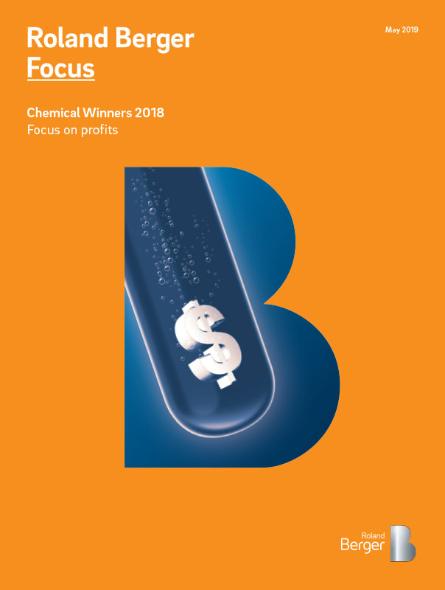Chemical industry: strong year – with less growth
![{[downloads[language].preview]}](https://www.rolandberger.com/publications/publication_image/roland_berger_505_chemical_winners_2019_cover_download_preview.jpg)
There is a new trend in the strong chemical industry. The sector now focuses on profitability instead of growth.


Less growth and macroeconomic challenges – including Brexit and increasing protectionism – have barely affected the chemical industry recently. In fact, 2018 was another strong year for the sector. This is the finding of Roland Berger’s study “Chemical Winners 2018 – Focus on Profits,” which examines the financial performance of 170 chemical companies in the US and Europe and provides an industry overview.
The total sales of the 170 chemical companies surveyed rose by 9% last year compared with 2017 – and the profitability of the chemical industry as a whole was also strong last year. Although the EBIT margin of 12% was lower than the 13% in 2017, the overall EBIT dollar improved as the chemical industry saw industry-wide sales growth of 4%.
Given the risk-adjusted (ROI) that Roland Berger believes provides a better indication of true profitability, the chemical industry earned two percentage points more than its cost of capital. Meanwhile, the chemical industry’s debt burden increased by 10%, although several mega-mergers were responsible for this. These include Bayer-Monsanto, ChemChina-Syngenta and Agrium-Potash Corporation.
The S&P 500 index comprises the shares of 500 of the largest US listed companies and is one of the most highly regarded stock indices in the world. While the chemical industry was still well above the index in 2017, it remained well below it last year. Yields in the S&P 500 fell by 6% and those in the chemical industry by as much as 8%.
In 2017, the chemical industry was still five percentage points above the S&P 500, albeit driven by strong US economic growth in conjunction with the “Trump Bump,” which was characterized, among other things, by a favorable tax policy for companies and a positive oil price swing. Much of the decline in 2018 was driven by diversified companies, followed by specialties, in particular some big players affected by rising commodity prices and industry consolidation.
"Investors have clearly rewarded the returns in 2018. This is a notable difference from previous years, which were characterized primarily by the desire for growth. "
In contrast to previous years, the focus of the chemical industry and its investors in 2018 was also clearly on profitability. The study “Chemical Winners 2018 – Focus on Profits” by Roland Berger shows: The companies that achieved the best shareholder returns were generally the ones that launched transformation programs aimed at short- and long-term performance improvements.
Roland Berger’s analysis of the performance of shareholder returns compared to growth and profitability shows that the performance of the programs is very positive. Investors have clearly rewarded the returns in 2018. This is a notable difference from previous years, which were characterized primarily by the desire for growth. And this focus on profitability is likely to continue in 2019.
The result last year: Instead of investing in inorganic growth, chemical companies returned more capital to shareholders and dividends payouts grew by nine US dollars, 19% over 2017 levels – three times their five-year historical average growth rate.

![{[downloads[language].preview]}](https://www.rolandberger.com/publications/publication_image/roland_berger_505_chemical_winners_2019_cover_download_preview.jpg)
There is a new trend in the strong chemical industry. The sector now focuses on profitability instead of growth.
